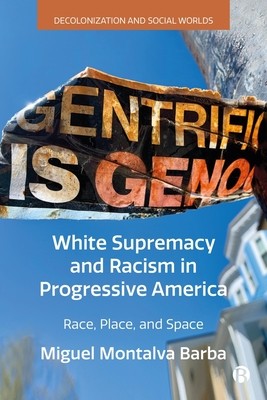
- We will send in 10–14 business days.
- Author: Miguel Montalva Barba
- Publisher: Bristol University Press
- ISBN-10: 152923543X
- ISBN-13: 9781529235432
- Format: 15.6 x 23.4 x 1.1 cm, hardcover
- Language: English
- SAVE -10% with code: EXTRA
White Supremacy and Racism in Progressive America (e-book) (used book) | bookbook.eu
Reviews
Description
This book examines the connections between race, place, and space, and sheds light on how they contribute to the creation of racial hierarchies. The author focuses on the white residents of Jamaica Plain, Massachusetts, which, according to the Cooks Political Report Position Voting Index, is the most liberal district in the state and 15th in the United States of America. Paying particular attention to Jamaica Plain's settler colonial history, the book explores how self-identified progressive white residents perceive their changing neighborhood and how the process of gentrification influences their perception of their positionality. Using the extended case method, as well as in-depth interviews, participant observation, content analysis and visual/media analysis, the author reveals how systemic racialized inequality persists even in a politically progressive borough.
EXTRA 10 % discount with code: EXTRA
The promotion ends in 20d.23:40:14
The discount code is valid when purchasing from 10 €. Discounts do not stack.
- Author: Miguel Montalva Barba
- Publisher: Bristol University Press
- ISBN-10: 152923543X
- ISBN-13: 9781529235432
- Format: 15.6 x 23.4 x 1.1 cm, hardcover
- Language: English English
This book examines the connections between race, place, and space, and sheds light on how they contribute to the creation of racial hierarchies. The author focuses on the white residents of Jamaica Plain, Massachusetts, which, according to the Cooks Political Report Position Voting Index, is the most liberal district in the state and 15th in the United States of America. Paying particular attention to Jamaica Plain's settler colonial history, the book explores how self-identified progressive white residents perceive their changing neighborhood and how the process of gentrification influences their perception of their positionality. Using the extended case method, as well as in-depth interviews, participant observation, content analysis and visual/media analysis, the author reveals how systemic racialized inequality persists even in a politically progressive borough.


Reviews